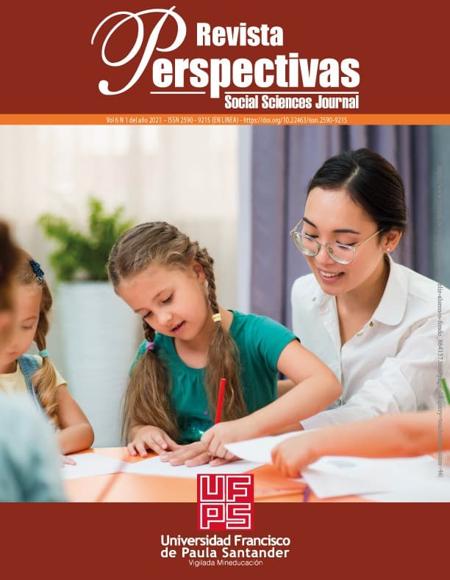The role of educational agents and their impact on the beneficiary households of the association of parent’s community homes invasion la Esperanza de Villa del Rosario.
El rol de las agentes educativas y su incidencia en los hogares beneficiarios de la asociación de padres hogares comunitarios invasión la Esperanza de Villa del rosario.
Main Article Content
Historically, the Colombian Government has formulated public policies aimed at promoting the comprehensive development of children and adolescents and it has established mechanisms to support the care and protection of children whose rights are not guaranteed, that is why it is necessary to point out the relevance of this research for society; that is to say, how it investigates trajectories, educational behaviors and formative contributions, the recognition of the roles and social structure in which community mothers find themselves, where a greater understanding of their responsibility in the comprehensive education of minors has been achieved, located in the hope invasion in the municipality of villa del Rosario.
The results obtained in this research identified the roles played by educational agents in the home at the personal level, the contribution of different community educational projects to pedagogical practices, such as educational practices are carried out in children, the use of new strategies, and the day in the community home and the response given to the different activities proposed, as well as the different strategies that have been developed by children and parents, within roles there is complementarity between roles, when the different roles of a person are incompatible; a conflict between them when the expectations that different people have of the same role are in disagreement; there is ambiguity, when there is no certainty of what a certain role entails (Payne, 1995, p.201).
With regard to the relationship of this theory to the topic of research, account was taken of the actors who play a role in society, as well as the role played by community mothers, as their social transformation has been shaped and assumed, being more relevant their work as caregivers and linked to the members of the beneficiary families, on the other hand, such us was perceived the importance of the educational agents, in their dynamics, as are the relationships and what produces changes that affect minors.
Downloads
Article Details
Andrade, Rodrigo Rojas. (2013). El liderazgo comunitario y su importancia en la intervención comunitaria. Psicologia para América Latina, (25), 57-76. Recuperado em 20 de abril de 2021, de http://pepsic.bvsalud.org/scielo.php?script=sci_arttext&pid=S1870-350X2013000200005&lng=pt&tlng=es
Bedoya, H. (2016). Madres comunitarias antioqueñas y su vocación por el cuidado. Revista Virtual Universidad Católica del Norte, 47, 113-127 Recuperado de http://revistavirtual.ucn.edu.co/index.php/RevistaUCN/article/view/745/1271.
Campos, A. (2010). Primera infancia: una mirada desde la neuroeducación. Lima: Cerebrum & OEA.
Díaz, L., Torruco, U, Martínez, M y Varela, M. (2013). La entrevista, recurso flexible y dinámico. Investigación en Educación Médica, 2(7),162-167. Disponible en: https://www.redalyc.org/articulo.oa?id=3497/349733228009 DOI: https://doi.org/10.1016/S2007-5057(13)72706-6
Escobar, J. y Bonilla, F. (s.f.). Grupos focales: una guía conceptual y metodológica. Cuadernos hispanoamericanos de psicología, 9(1). Pp. 51-67. Recuperado de: http://www.tutoria.unam.mx/sitetutoria/ayuda/gfocal-03122015.pdf
García, A., Hernández, A., & Recamán, A. (2012). La metodología del aprendizaje colaborativo a través de las TIC: Una aproximación a las opiniones de profesores y alumnos/Methodology of collaborative learning through ICT: An approach to the professors and students opinions. Complutense de educación, 23(1), 161-188. Obtenido de https://revistas.ucm.es/index.php/RCED/article/view/39108 DOI: https://doi.org/10.5209/rev_RCED.2012.v23.n1.39108
Gonzales, E. (2013). Acerca del estado de la cuestión o sobre un pasado reciente en la investigación cualitativa con enfoque hermenéutico. Unipluriversidad, 13(1), 60- 63. Obtenido de http://bibliotecadigital.udea.edu.co/bitstream/10495/3313/1/GonzalesElvia_2013_estadocues tioninvestigacioncualitativa.pdf
Instituto colombiano de bienestar familiar integrales. (2018). Hogares comunitarios de bienestar. s.l.: s.n. Obtenido de https://www.siteal.iiep.unesco.org/sites/default/files/sit_accion_files/co_2006_0.pdf
Instituto Colombiano de bienestar familiar. (2020). Lineamiento técnico para la atención a la primera infancia. s.l. Obtenido de https://www.icbf.gov.co/system/files/procesos/lm5.pp_lineamiento_tecnico_para_la_atencio n_a_la_primera_infancia_v5.pdf
Jaimes Márquez, M. C. & Galvis Velandia, L. N. En tiempos de COVID -19, volver a la esencia, una mirada desde el Trabajo Social. En El Covid-19 y la reinvención: Perspectivas mutantes de existir y habitar en pandemia (págs. 123-124). Cùcuta : Ediciones Nueva Jurìdica. . (2020).
Jaimes Márquez, M. C., Galvis Velandia, L. N., & Caucali García, S. (2019). Mujeres sobrevivientes del conflicto armado y reconstrucción del tejido social: una mirada desde el enfoque de las capacidades humanas. Revista Perspectivas, 4(1), 32-38. https://doi.org/10.22463/25909215.1753 DOI: https://doi.org/10.22463/25909215.1753
Méndez, N. (2014). La acción socioeducativa y la investigación acción en la democratización de la vida cotidiana. Costarricense de Trabajo Social, 73-77. Obtenido de https://revista.trabajosocial.or.cr/index.php/revista/article/view/183
Ochoa, M., & Ariza, N. (2009). Valoracion de las competencias de los agentes educativos vinculados al programa hogares ICBF. Barranquilla: Fundación Promigas. Obtenido de http://www.fundacionpromigas.org.co/es/Biblioteca/Investigaciones/Inv010.pdf
Payne, M. (1995). Teorías contemporáneas del trabajo social: una introducción crítica (Vol. 11). Grupo Planeta (GBS).
Pizarro Laborda, Paulina; Santana López, Alejandra; Vial Lavín, Bernardita La participación de la familia y su vinculación en los procesos de aprendizaje de
los niños y niñas en contextos escolares Diversitas: Perspectivas en Psicología, vol. 9, núm. 2, 2013, pp. 271-287 DOI: https://doi.org/10.15332/s1794-9998.2013.0002.03
Planella, J. (2005). Pedagogía y hermenéutica: de Hegel a Gadamer. Revista de Educación, 328(12), 1-11. pp. 741-753. DOI: https://doi.org/10.35362/rie36122739
Salas, C. (2001). Implicaciones educativas de la teoría sociocultural de Vigotsky. Revista educación, 25(2), 59-65. DOI: https://doi.org/10.15517/revedu.v25i2.3581
Valencia, V. (2012). Revisión documental en el proceso de investigación. Universidad Tecnológica de Pereira. Bogotá, Colombia.
Vírseda-Sanz, Eloy (2012). Trabajo social con familias. Portularia, XII(2),129-130. ISSN: 1578-0236. Disponible en: https://www.redalyc.org/articulo.oa?id=161024690012 DOI: https://doi.org/10.5218/prts.2012.0051
Viscarret, J. (2009). Modelos de intervención en Trabajo Social. En Fundamentos del Trabajo Social (págs. 293-345). s.n.







